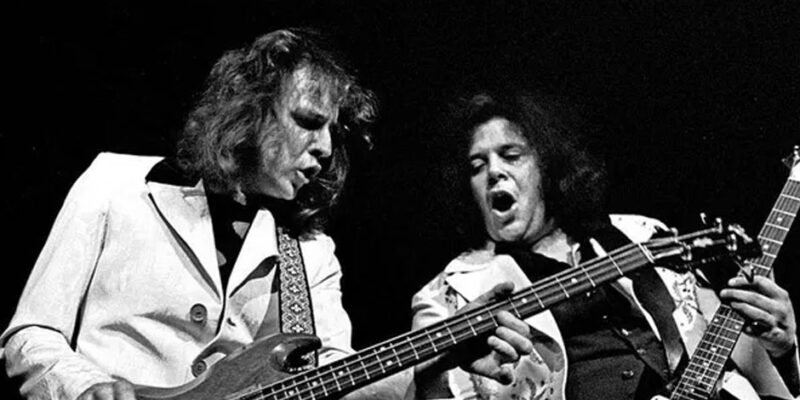Introduction
Welcome to the fourth part of our exclusive “lost tapes” interview series with the late Cream bassist, Jack Bruce. In this segment, Bruce shares more insights into his bandmates, Eric Clapton and Ginger Baker, and reveals his favorite Cream songs.
The Synthesis of Music: “White Room”
Jack Bruce: When asked about his favorite Cream song, I would have to say it’s “White Room.” The inspiration for the music came from a meeting with the legendary Jimi Hendrix, who had a unique approach to playing the guitar. Interestingly, Hendrix even attended the recording session of “White Room” in New York and expressed his admiration for the song. I remember him saying to me, “I wish I could write something like that,” to which I replied, “But it comes from you!” It’s incredible how creativity flows and influences one another in the world of music. “White Room” is a synthesis of various elements, and while the chord sequence may not be entirely original, the way we placed certain musical elements in time made it stand out. I recall having some disagreements with the record company about the song’s introduction being in 5/4 time and featuring suspended second inversion chords. They were skeptical about its commercial potential, but we stood our ground.
Jack Bruce: I’ve always thought that record companies, in particular, tend to underestimate their audiences’ appreciation for good musical craftsmanship. Instead, they often opt for a more straightforward and commercially viable approach. Their reasoning seems to be that if the audience enjoys simple, easy-to-digest music, then they won’t have to go through the trouble of finding and promoting more musically complex and innovative pieces. However, music is art, and we should embrace its diversity and creativity without compromising for the sake of commercial success. After all, it’s only rock and roll [laughs].
Captivated by The Beatles: “I Feel Free”
Jack Bruce: Another Cream song that holds a special place in my heart is “I Feel Free,” which was our second single. During those days, I was fascinated by The Beatles’ ability to convey powerful messages in their songs within a concise two-and-a-half to three-minute time frame. I admired their artistry and was keen to achieve something similar in our music. Although I don’t think I quite managed to do it as effectively as they did [laughs], “I Feel Free” remains one of our memorable tracks.
Ginger Baker’s Struggles
Jim Clash: Speaking of the early days of Cream, there have been discussions about drug use within the band, particularly with Ginger Baker. Can you shed some light on that?
Jack Bruce: Let’s be honest about it. Ginger was a junkie when I first met him in the early ’60s. He was a registered heroin addict in England and would visit a famous doctor to get prescriptions. Back then, the system was quite different, and getting prescriptions for certain drugs was relatively easy. Ginger had his moments of falling off the wagon, especially when we experienced early success and the pressures that came with it. Sometimes, he would do something ill-timed, like overdosing in the dressing room [laughs]. However, I must clarify that during the early days of the band, we had an unspoken rule that Ginger wouldn’t indulge in hard drugs, and to a large extent, he adhered to it.
Eric Clapton and Cream’s Formation
Jim Clash: It’s fascinating to hear about the formation of Cream. Can you share some insights into how the band came together?
Jack Bruce: Cream was, in fact, Ginger Baker’s idea. He wanted to collaborate with Eric Clapton, and when Ginger approached Eric, he was quite interested but had one condition. Eric said, “Yes, but we need to get Jack in as the lead singer and on bass.” So, that’s how it happened. It’s funny because I never really considered myself a singer, but Eric appreciated my voice and wanted me in the band.
Eric Clapton’s Nostalgia for Cream Days
Jim Clash: Speaking of Eric Clapton, he often receives more recognition for Cream’s success. Do you believe he looks back fondly on his days with the band?
Jack Bruce: Of all the musicians from the old bands, Eric has had tremendous success both commercially and musically on his own terms. However, I think he acknowledges that musically, Cream represented a high point for him. In fact, I remember him expressing this sentiment when we played together again at the Rock And Roll Hall Of Fame in 1993. Many people who have listened to Eric’s later works miss the kind of inspirational quality he had in his playing during our Cream days. Some of that music was never even released. As a three-piece band, we needed some showmanship to pace our performances, so Eric would sometimes play unaccompanied for 15 or 20 minutes, captivating the audience with his exceptional talent. He had a unique ability to transport listeners to another world through his music.
The Legacy of Cream
Jim Clash: Considering the immense impact of Cream and its members, how do you feel about the recognition you have received as a musician?
Jack Bruce: Well, I must say that while Eric often received more credit, that’s just how show business works. It’s common for certain members of a band to garner more attention and recognition. On the other hand, I am fundamentally a musician who has been fortunate enough to pursue what I love and make a good living out of it. From that perspective, I am content and appreciative of the recognition I have received. It’s always heartwarming to be acknowledged for your contributions to the music scene during that period.
Jim Clash: And you deserve it! You have undoubtedly left a significant impact on the world of music, especially as one of the most celebrated bassists of that era.
Jack Bruce: Thank you, Jim. I’m very happy to hear that.
Conclusion
Jack Bruce’s insights into Cream’s iconic songs and his relationship with bandmates Eric Clapton and Ginger Baker provide a unique perspective on the band’s legacy. “White Room” and “I Feel Free” remain among the most memorable tracks from Cream’s repertoire, and Bruce’s musical prowess continues to be celebrated within the industry. Cream’s music and impact endure, leaving an indelible mark on the world of rock and roll.
This is Part 4 of the “Lost Tapes” series. Stay tuned for more exclusive insights from Jack Bruce on Cream’s journey.













Comments